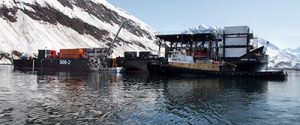Council invited to observe trainings, ship construction, on-water exercises

In June, Alyeska Pipeline officially confirmed that Edison Chouest Offshore will take over from Crowley Maritime as the provider of oil spill prevention and response services for the terminal and tankers in Prince William Sound. The overlap of Crowley and Edison Chouest’s marine assets in Prince William Sound will take place over a three to six week period in the summer of 2018.
The contract, signed in early August, is effective until 2028.
Edison Chouest is planning five new escort tugs, four new general purpose tugs, three new barges, and two line boats. Construction of the general purpose tugs began this summer. Edison Chouest is planning to purchase two barges currently in Prince William Sound and build three new barges.
Edison Chouest owns shipyards in the Gulf of Mexico, and the majority of the testing will be done nearby. Further testing will be done in Puget Sound and later in Prince William Sound once the vessels arrive in the region.
Alyeska has promised further details about the vessels such as escorting performance specifications, firefighting capabilities, and spill response equipment in the near future.
Observing the process
The council is attending meetings along with ADEC, the Coast Guard, and Crowley for updates and information from Alyeska and Edison Chouest. Roy Robertson, the council’s drill monitor, has been attending on behalf of the council.
“They have offered us the opportunity to observe vessel construction, crew trainings, and on-water exercises,” said Robertson. “We are setting aside funds for these trips to the shipyards and training facilities in the Gulf of Mexico.”
Robertson says these observations will be helpful to verify the details, but that the council would have liked to have seen more information earlier in the process. “We could have provided them more specific input and advice prior to design of the vessels,” he added.
The council is developing specific recommendations regarding equipment capabilities and the process to ensure that crews are adequately trained and qualified before the new contractor takes over. The council has hired several advisors to help provide recommendations and advice on the technical details and best practices.
“The council’s main concerns right now are that the equipment meets or exceeds existing prevention and response standards, and that the crews are well-trained and familiar with preventing and responding to oil spills in the Alaskan environment,” said Donna Schantz, executive director of the council.
Crowley Marine will continue providing services until the transition to Edison Chouest is complete and regulators have signed off on the capabilities and qualifications of the new equipment and crews.